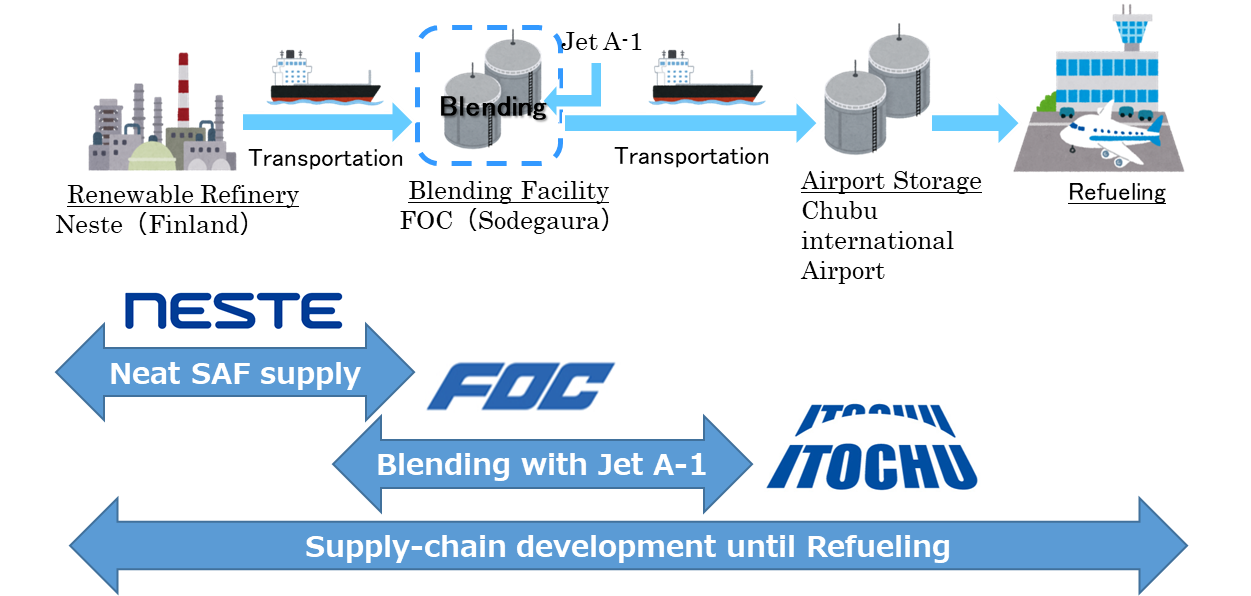ITOCHU Announces Adoption of the “Imported Neat SAF Model Demonstration Project” Japan's first import of neat SAF and establishment of a domestic jet fuel blending supply chain
November 1, 2022
ITOCHU Corporation (headquartered in Minato-ku, Tokyo; Keita Ishii, President and COO; hereinafter "ITOCHU") announced today that it has applied for and been selected for the "Imported Neat SAF Model Demonstration Project (the Project)" publicly solicited by the Civil Aviation Bureau, Ministry of Land, Infrastructure, Transport and Tourism. In this project, ITOCHU will import neat SAF from Neste OYJ (headquartered in Finland; Matti Lehmus, CEO; hereinafter "Neste") for the first time in Japan, and demonstrate blending of neat SAF with conventional fossil jet fuel and certification of the blended SAF in cooperation with Fuji Oil Co. Ltd. (headquartered in Shinagawa-ku, Tokyo; Shigeto Yamamoto, President; hereinafter "Fuji Oil"). A portion of the SAF blended in Japan will be delivered to Central Japan International Airport to be supplied to flight inspection aircraft owned by the Civil Aviation Bureau of the Ministry of Land, Infrastructure, Transport and Tourism. Neat SAF is scheduled to be imported around January, after which neat SAF will be blended with conventional fossil jet fuel and delivered to Chubu International Airport around February.
The International Civil Aviation Organization (ICAO) General Assembly has set a goal of achieving net zero carbon emissions from aviation by 2050, and from 2024 onward, the industry will be required to reduce or offset emissions by 15% from the 2019 level.
Currently, SAF is produced mainly in Europe and in limited quantities. In order to realize a stable supply of SAF in Japan, it is important to expand the domestic supply chain of imported SAF as well as the medium- to long-term commercial-scale production of domestically produced SAF under a cooperative framework between the public and private sectors.
Currently, a certain percentage of neat SAF* must be blended with fossil-based jet fuel in accordance with ASTM D7566 and D1655, the international standards for SAF supplied to aircraft, and ITOCHU has imported and supplied SAF blended overseas. Through this demonstration project, ITOCHU will import neat SAF for the first time in Japan, blend it with fossil-based jet fuel in Japan, and establish a supply chain to transport it to the airport, thereby establishing know-how for handling neat SAF in Japan, which will lead to the early establishment of a foundation for the use of significantly larger volumes of domestically produced and imported SAF in the future.
ITOCHU has already established domestic supply chains at Haneda Airport and Narita International Airport as supply bases for SAF, from SAF import and quality control to delivery to airports, and has developed a refueling network for aircrafts themselves. In addition to the development of Central Japan International Airport in conjunction with this demonstration project, we plan to expand the supply of SAF to domestic and foreign airlines by extending it to Kansai International Airport and other airports in the future.
As the world's largest producer of renewable fuels, Neste is expanding its global SAF operations. With the expansion of its Singapore plant and the upgrading of its plant in the Netherlands, its global production volume is expected to reach 1.5 million tons per year by the end of 2023 and 2.2 million tons per year by the first half of 2026. ITOCHU concluded a Branded Distribution Marketing Agreement with Neste in February 2022, and will work to ensure a stable supply of SAF in Japan based on this partnership.
One of the basic policies of ITOCHU's medium-term management plan is to "contribute to and strengthen initiatives for the SDGs," and ITOCHU will continue to contribute to the realization of a recycling-oriented society through the spread of renewable fuels in cooperation with leading partner companies.
-
*Neat SAF is a jet fuel produced from biomass materials, etc., and must be blended with a certain percentage of fossil-based jet fuel before it can be used in aircraft. Depending on the raw material and production method, the maximum amount of neat SAF that can be blended with fossil-based jet fuel is defined, and SAF manufactured by Neste can be blended up to 50%.
Neat SAF and SAF after blending must be confirmed to comply with ASTM D7566, the international standard for SAF, and ASTM D1655, the international standard for JET fuel.
|
|

